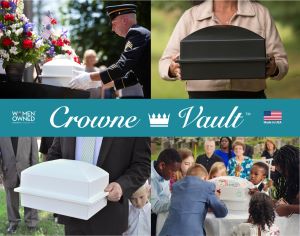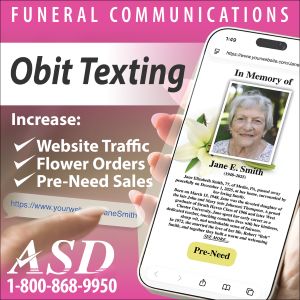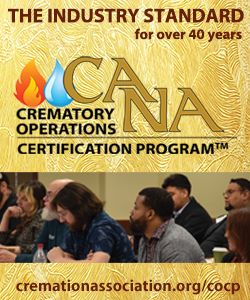. . Dream things that never were and say “Why not”

When Ted Kennedy eulogized his brother Bobby (RFK) at his funeral following his assasination in 1968 he made this comment about what RFK had at one time said about his ability to look forward, “Some men see things as they are and say why. I dream things that never were and say why not.” Here is a copy of that eulogy.
I often think of that phrase when I think “outside the box” for solutions. And, today with the Death Care world centered in Chicago I thought it might be a good time to give you a couple of my “Why not” ideas.
My thoughts were somewhat re-kindled when I read this recent article in Geek Wire about Recompose, the original natural organic reduction business. The article is not only about Recompose’ success but about their desire to move forward with additional locations. And, one of their thought processes to do so is with the concept of “Franchising”.
Franchising is one of my “outside the box” ideas. I’ve often thought that a Direct Cremation business would be perfect for this type of growth. Franchisors (those that franchise) develop systems of operations leading to profits that can be replicated. Franchisees (those that eventually buy into and own the local franchise) have the abilty to purchase and operate their own business, that has a proven track record, under the conditions set up by the franchisor for, in most cases, a percentage of revenue paid to the franchisor.
I think that there are many young people willing to work hard and build their own business in Death Care without the financial ability to build a traditional funeral home. However, a direct cremation, pre-arrangement, celebration, and services “franchise” could be operated from a leased strip mall location with an additional cremation building in another location. It could even be done without a cremation building and using a local trade crematory if necessary.

A Neptune Society mall location
Think of an operation such as Neptune Society — already with a formidable name in the direct cremation business and how they could rapidly expand their business by offering franchises. By my count, there are probably at least 200 SMSA’s (Standard Metropolitan Statistical Areas) that could, by population, support their own distinct direct cremation franchise. . . . .Who knows, maybe existing traditional funeral homes would purchase a direct cremation franchise in their own community to gain that end of the Death Care spectrum market share. (Here’s a list of America’s SMSA’s)
As an aside here on the idea of SCI offering Neptune Society franchises that might be purchased by existing large traditional funeral homes to help them capture that lower-cost share of the Death Care market. . . . . the idea of the existing business relationship as franchisor/franchisee of SCI and these funeral homes would probably give SCI an edge over others in being able to acquire the existing funeral homes at some point in the future — if they were interested in the aquisition.
Finally, in the business world of Death Care that strives on local “brands” the ability for a national franchisor of direct cremation to utilize franchisee advertising fees to build a national brand might prove formidable to local direct cremation companies as our society moves forward and Death Care provider choices change.
My second “outside the box” thought has to do with Royalty Payments. I’ve thought of this for some time and, while there would be pros and cons for both buyers and sellers, I wonder if anybody has ever sold their funeral home on a price that included, in part, future royalty payments on the revenues of the business under the new owners?

Tom Anderson
Funeral Director Daily
For instance the ABC Funeral Home is up for sale and a value is determined. Instead of taking that value, would they be better off to take less than the full price and then receive a percentage of revenues going forward for a period of time? Again, pros and cons to it — such as a buyer can pay less up front and a seller will get less up front. . . . but then, there are expected recurring payments.
Again, a big part of the family funeral home’s value is in their name and reputation. By having a royalty payment they would be able to share in the, hopefully, ever-increasing value of the brand instead of being paid off at the sale time and receive nothing for the future value and goodwill of their name. And, I would suggest a deferred payment(s) for a “date-specific” sale value is not the same as a royalty that could grow by increasing use of the business by consumers — at least some consumers who will only continue to use the funeral home because of the former owner and their relationship with them.
Who knows. . . . this financial incentive might also make for a better past owner relationship with the new owners.
Anyway. . . thoughts outside the box. As American business methods and modes continue to evolve, I don’t think funeral homes should be left out of new ways of thinking.
Related — The Listerine royalty payment story — In 1881 the owners of what we now know as Listerine mouthwash allowed others to know the formula, bottle, and sell their product. For this knowledge they asked for a $20 payment for every 144 bottles sold. By 1884, because of poor sales, that royalty payment dropped to $6 for every 144 bottles (14 oz. bottles) sold.
The interesting thing about that contract is that there was no end date set and Listerine eventually became a popular product. Today, the current holders of the Listerine Royalty contract are still paid $6 for every 2,016 ounces (144 14 oz. bottles) of the product sold. It equates to millions of dollars annually.
My point is that even with only a small royalty a family-owned funeral home, over time, can create more and more wealth opportunities for descendents while at the same time allowing a new owner to “get-in” the business for a lower up-front investment.
More news from the world of Death Care:
- Everest Funeral Concierge expands it services with group benefits offering U.S. employers a new way to comprehensively support employees experiencing loss. Business Wire through Yahoo Finance.
- How long have people made mummies? History.com
- Endswell works towards becoming the first carbon-neutral funeral home in the country. The Daily Tar Heel (NC)
- Parting Stone launches pre-need plans for solidified remains. Globe Newswire
- Valley Burial and Cremation celebrates 40 years of compassionate service to Puyallup families. EIN Presswire through NexStar Media
Enter your e-mail below to join the 3,201 others who receive Funeral Director Daily articles daily
“A servant’s attitude guided by Christ leads to a significant life”




















